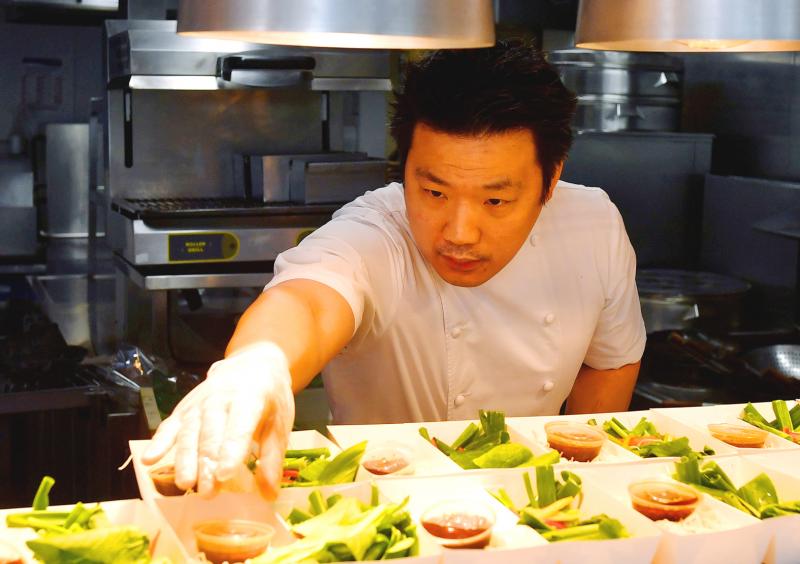Andrew Wong knew from an early age that running a restaurant required improvisation, having watched his parents steer their London Chinese restaurant through nearly 30 years of good times and bad.
The Michelin-starred chef is now drawing on that experience, one of hundreds of high-end restaurant owners looking to take their “temples of gastronomy” to a wider audience while the coronavirus keeps diners away.
Where once customers would fly in for a booking made months in advance, London’s most famous eateries across Mayfair, Knightsbridge, Notting Hill and Chelsea are now offering takeaways, online cooking classes and recipe boxes.

Photo: Reuters
“You will see a lot of restaurants beginning to diversify,” Wong said in his A Wong restaurant in Pimlico, central London, the same building where his parents were based.
“What we will see is restaurants no longer being just temples of gastronomy where people come from all over the world, but really restaurants going out into the world.”
Employing 2.9 million people, Britain’s broader hospitality sector faces an existential threat if it cannot incorporate social distancing rules to tightly packed restaurants that serve a lot of meals just to cover their costs.
Britain’s restaurants, once the butt of jokes for Europeans, flourished over recent decades but the coronavirus lockdown has choked them of cash, leaving many owners with high debts, London rents and a bleak future.
Wong believes many higher-end restaurants already adhere to social distancing for customers while they also have more scope to hike prices and reduce covers.
But in his own restaurant, part of the experience comes from the front-of-house team led by his wife Nathalie who explains the ancient Chinese regional cooking techniques used to produce dishes such as Xian city lamb burger.
“Masked up, gloved up in front of house: you’re putting up a psychological barrier. The job for myself and the team is to come up with possible solutions,” he said.
While Wong has his reputation to help him through the turmoil — he has opened a second restaurant, Kym’s, near the Bank of England — others were just making a name for themselves.
After meeting in the kitchen of Dinner by Heston Blumenthal, chefs Will Murray and Jack Croft had just opened Fallow off Regent Street when they had to shut 10 days later.
They did not qualify for the government’s salary support scheme and are trying to raise money for a reopening by taking donations, doing deliveries and providing BBQ packs and online cooking tutorials: bit.ly/3fplceT.
“We will find a way, restaurateurs are resilient. But there are not going to be as many around,” James Robson, Fallow’s chairman, said.
James Hacon of Think Hospitality says the government will need to support restaurants through social distancing because they will not be financially viable otherwise.
In Pimlico, Wong will improvise.
“What else can you do?” he said.

In the March 9 edition of the Taipei Times a piece by Ninon Godefroy ran with the headine “The quiet, gentle rhythm of Taiwan.” It started with the line “Taiwan is a small, humble place. There is no Eiffel Tower, no pyramids — no singular attraction that draws the world’s attention.” I laughed out loud at that. This was out of no disrespect for the author or the piece, which made some interesting analogies and good points about how both Din Tai Fung’s and Taiwan Semiconductor Manufacturing Co’s (TSMC, 台積電) meticulous attention to detail and quality are not quite up to

April 21 to April 27 Hsieh Er’s (謝娥) political fortunes were rising fast after she got out of jail and joined the Chinese Nationalist Party (KMT) in December 1945. Not only did she hold key positions in various committees, she was elected the only woman on the Taipei City Council and headed to Nanjing in 1946 as the sole Taiwanese female representative to the National Constituent Assembly. With the support of first lady Soong May-ling (宋美齡), she started the Taipei Women’s Association and Taiwan Provincial Women’s Association, where she

Chinese Nationalist Party (KMT) Chairman Eric Chu (朱立倫) hatched a bold plan to charge forward and seize the initiative when he held a protest in front of the Taipei City Prosecutors’ Office. Though risky, because illegal, its success would help tackle at least six problems facing both himself and the KMT. What he did not see coming was Taipei Mayor Chiang Wan-an (將萬安) tripping him up out of the gate. In spite of Chu being the most consequential and successful KMT chairman since the early 2010s — arguably saving the party from financial ruin and restoring its electoral viability —

It is one of the more remarkable facts of Taiwan history that it was never occupied or claimed by any of the numerous kingdoms of southern China — Han or otherwise — that lay just across the water from it. None of their brilliant ministers ever discovered that Taiwan was a “core interest” of the state whose annexation was “inevitable.” As Paul Kua notes in an excellent monograph laying out how the Portuguese gave Taiwan the name “Formosa,” the first Europeans to express an interest in occupying Taiwan were the Spanish. Tonio Andrade in his seminal work, How Taiwan Became Chinese,